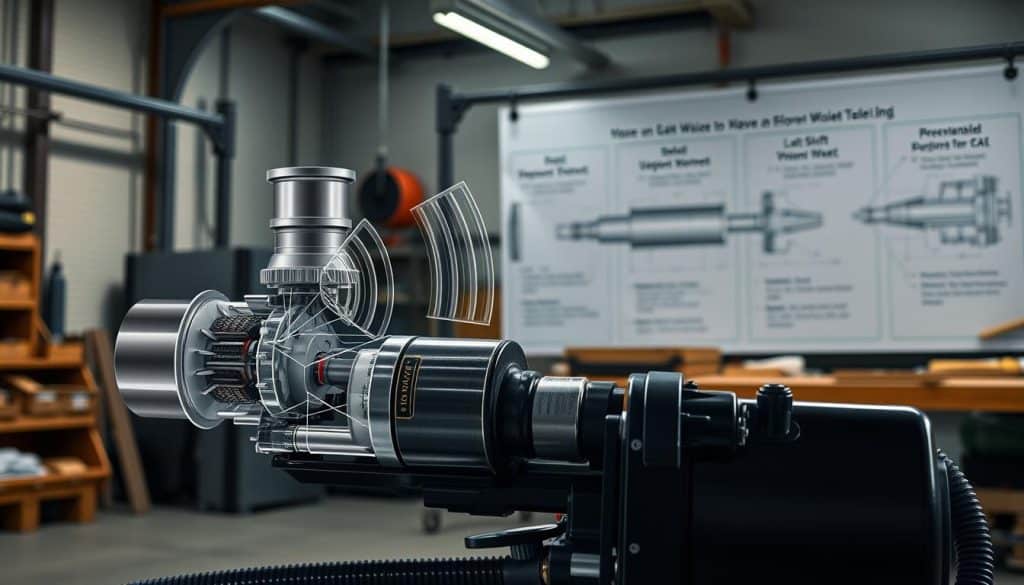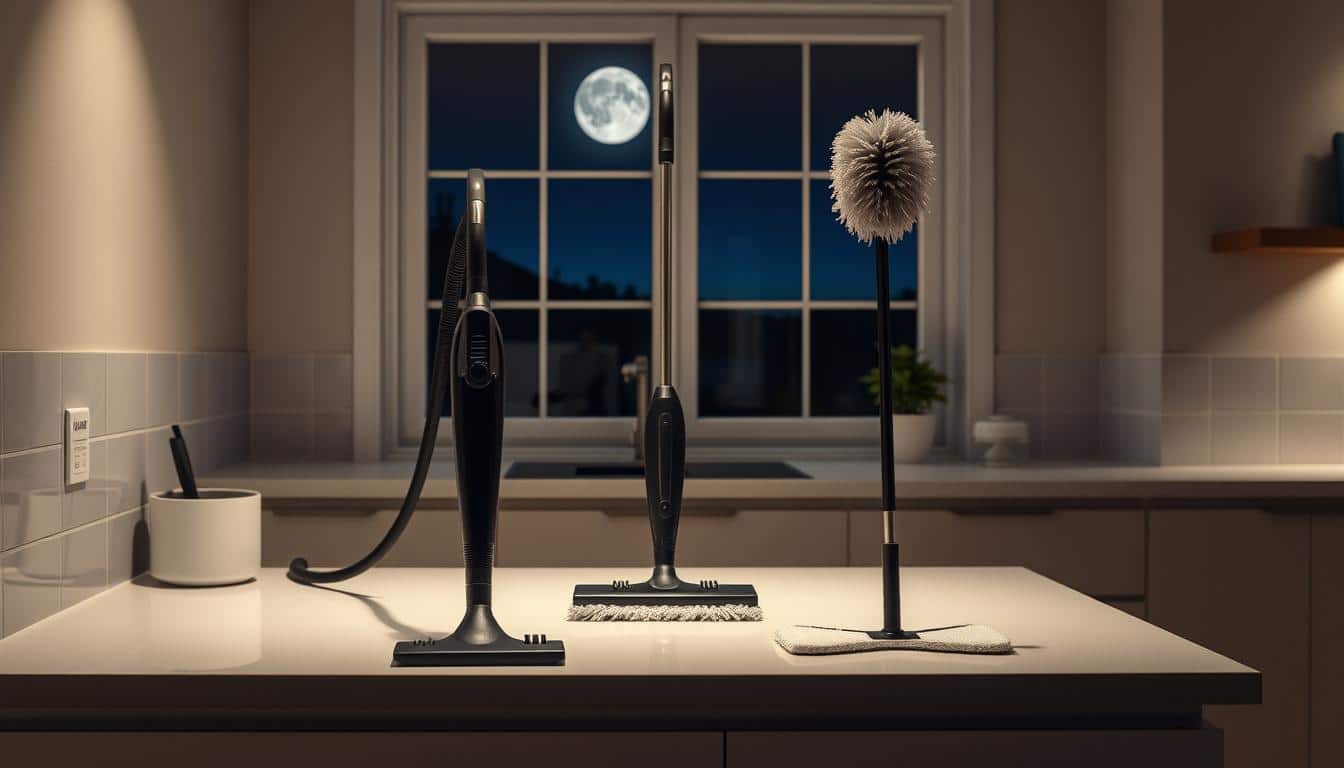Working late shifts calls for a peaceful home to come back to. The last thing you need is noisy cleaning disturbing you. Quiet cleaning methods are crucial for unwinding and sleeping well.
This article looks at low-noise cleaning options perfect for the night. It shows how to keep your space clean while still keeping things quiet. The right tools and methods mean you can clean without breaking the peace.
Understanding the Need for Quiet Cleaning
Quiet cleaning is crucial for those working late. People in healthcare and hospitality often work when others sleep. They need a quiet place to rest well, not disturbed by loud cleaning.
Loud cleaning noises can stop them from resting well. This can hurt their health over time.
Making cleaning quieter helps reduce irritability and tiredness. It benefits late shift workers’ health and makes the workplace better. Using quiet cleaning methods lets them rest well before their next shift. This shows how a peaceful place can improve their work and life.
Impact of Noise on Late Shift Workers
Noise greatly affects those who work late shifts. These workers have sleep and overall health issues. It’s critical to understand how noise affects health to help them.
The Effects of Loud Noises on Sleep and Health
For people working at night, loud sounds are a big problem. Noise above 50 dB(A) at night can increase stress hormones. This raises the chance for heart problems.
Being around a lot of noise for a long time can also make blood pressure go up. It can cause health issues to get worse. Night shift workers may find it hard to sleep well, leading to more health problems.
Importance of a Peaceful Environment
A quiet place is crucial for night workers to sleep well. A peaceful environment helps them recover and stay healthy. It’s important to keep noise away from their sleep.
This helps them balance work and rest. Making a quiet space lowers the chance of stress and improves sleep. This leads to a healthier life for them.
Decibel Levels Explained
It’s important to understand decibel levels when picking cleaning tools. This helps keep things quiet. Noise levels tell us how loud places can be during the night. Knowing the noise range of vacuums helps us choose smarter.
A Breakdown of Common Noise Levels
Whispers are around 60 dB, and busy spots can go above 75 dB. Vacuum cleaners usually make noise between 60 to 80 dB. The quieter ones are in the mid-sixties, which makes cleaning sound manageable. Here are some examples:
- 60 dB: A quiet conversation
- 65 dB: Moderate vacuum cleaners
- 70 dB: Standard indoor noise
- 75 dB: Loud vacuuming
How Decibel Ratings Affect Your Cleaning Choices
Choosing quieter cleaners, with noise below 70 dB, cuts down on noise pollution. Especially for those working at night. It makes it possible to work in peace while cleaning. Picking cleaners that focus on lowering noise helps everyone get along in shared spaces.
Quiet Cleaning Options for Nighttime
For those who work at night and need to clean quietly, there are special tools. These vacuums keep places clean without waking up others.
Robot Vacuums: The Silent Helpers
Robot vacuums are a top choice for quiet cleaning at night. They work softly, making noise between 60-70 dB. The DEEBOT is a great example, working at 65 dB. It lets you set a cleaning time that doesn’t interrupt sleep.
Canister Vacuums: Quiet Yet Powerful
Canister vacuums balance strong cleaning and quietness. Their noise level is from 64 to 75 dB. This means they clean well without being too loud. They are designed to work silently, ideal for cleaning without noise.
Stick Vacuums: Lightweight and Low-Noise
Stick vacuums are good for silent night-time cleaning. They typically make about 60-70 dB noise. This makes them perfect for a quick tidy without much noise. Their design is easy to move around, helping you clean fast.
Choosing Quiet Cleaning Equipment
Looking for quiet cleaning tools? It’s important to know what features matter. Night shift workers need tools that won’t disturb. That’s why low noise is key.
Focus on noise ratings, how the motor is built, and how strong it sucks. Good tools work well without making a lot of noise. Unlike regular vacuums, they keep things peaceful.
Key Features to Look For
When picking quiet cleaning gear, here’s what to keep in mind:
- Noise Ratings: Go for less than 70 dB to stay quiet.
- Motor Design: Look for motors made to be less noisy.
- Suction Power: Quiet doesn’t mean weak. Good suction is a must.
- Noise Reduction Technologies: Special materials and design can make tools even quieter.
The Best Low-Decibel Vacuums on the Market
Choosing the right quiet vacuum can make night cleaning easier. Here are some top picks:
- Dyson V11: It’s quiet and strong, thanks to special tech.
- Electrolux EL7201A: It’s both quiet and light, making cleaning easier.
- Miele Complete C3: This vacuum is quiet and cleans really well.
Factors Affecting Vacuum Noise Levels
Choosing the right vacuum is key, especially if you clean late at night. The vacuum’s motor power and design greatly affect how loud it gets. When in use, these factors play a big role in noise levels.
The Role of Motor Power and Design
How loud a vacuum is can depend a lot on its motor. Usually, stronger motors mean more noise due to more air moving. This is common with upright vacuums.
However, canister and stick vacuums are quieter. They have motors placed in a way that cuts down on noise. This doesn’t compromise their power, making them great for quiet areas.
Noise Reduction Technologies in Modern Cleaners
New quiet technologies have changed vacuums for the better. Today’s vacuums often have silent motors. This reduces noise but keeps the vacuum powerful.
They also have special ways to handle air that cuts down on sound. These improvements make vacuuming less noisy and more peaceful.

Maintenance Tips for Keeping Your Vacuum Quiet
Keeping your vacuum in top condition is key to a quiet, efficient clean. By taking care of your vacuum, you not only enjoy a peaceful cleaning time but also extend its life. Follow these tips to keep your vacuum working smoothly and quietly.
Regular Cleaning and Filter Replacement
For a quieter vacuum, keep the filters clean. Dirty filters make vacuums noisier by making them work harder. Remember to check and change your vacuum’s filters regularly.
By doing this, you make sure your vacuum cleans well and runs softly. This makes cleaning more relaxing and enjoyable.
Checking for Loose Parts and Lubrication
Loose screws or parts can make your vacuum noisy. Often, a simple tightening can stop annoying rattles. Make it a habit to look over your vacuum and lubricate parts when needed.
This step helps your vacuum run smoothly and quietly. It turns cleaning into a more pleasant task.
Implementing Low-Decibel Cleaning for Late Shifts
Creating a good work environment at night means managing noise well. Using noise reduction strategies can boost late shift productivity and comfort. Knowing the best times to clean quietly is key.
Best Practice Cleaning Times
Choosing the right times for cleaning cuts down on disruptions. It’s best to clean during:
- Early afternoons
- Late mornings
Stay away from early mornings or late nights to avoid disturbing sleep. These times support effective cleaning and respect night workers’ sleep patterns.
Tips for Reducing Noise During Cleaning
For quieter cleaning, try these tips:
- Use low-noise vacuums made for quiet cleaning.
- Add soft surfaces like rugs to absorb sound.
- Put mats under vacuums to reduce vibrations and noise.
These methods help keep the work atmosphere calm. They ensure cleaning at night doesn’t bother anyone.
Automating Your Cleaning Tasks
Today’s fast-paced life makes automating cleaning tasks very helpful, especially if you work at night. Smart vacuums manage cleaning well while you get your sleep. They work while you rest, making your living space calm.
Using Smart Vacuums to Schedule Quiet Cleaning
Smart vacuums come with a feature to plan cleaning times. You can set them to clean when it’s late, keeping places clean without making noise. This automatic cleaning is convenient and makes cleaning tasks easier to handle.
Benefits of Robot Vacuums for Night Workers
For those who work at night, robot vacuums are a great help. They avoid the need for manual cleaning. They are quiet and work on their own, keeping places neat. This really improves life quality for those sleeping in the daytime.
Quiet Cleaning Solutions Beyond Vacuums
Effective cleaning goes beyond just vacuuming. It involves using low-noise methods that help those who work late shifts. There are many different ways to clean that keep things quiet. Using these methods means you can have both peace and cleanliness without any noise.
Damp Dusting Techniques for Low Noise
Damp dusting is great for keeping things quiet. It uses wet cloths to capture dust and allergens. This method is quiet, perfect for cleaning at night. It lets people relax without noisy distractions.
Using Non-Toxic Natural Cleaners
Using green cleaners like vinegar and baking soda is better for health and noise. These safe options work well and don’t need loud equipment. They are good for the planet and keep your home quiet.
Conclusion
Looking at the need for quiet cleaning solutions for late-shift workers shows us something important. Picking the right cleaning tools and methods is vital. It helps late-shift workers rest and recover better.
Quiet cleaning options, like high-tech robot vacuums and canister cleaners, make cleaning less noisy. This is a big win for those who really need quiet around them.
Choosing quiet cleaning tools does more than make things comfortable; it makes the atmosphere healthier. This is key for relaxing. As our work and home lives change, using new low-noise tech is important. It makes sure night-time cleaning doesn’t hurt the health of night workers.
It’s very important to use the right equipment. This helps make a calm home where people can sleep well and recover.
In the end, picking quiet cleaning methods shows how important a peaceful setting is. Moving ahead, we’ll need to keep focusing on cleaning that doesn’t disturb. This is essential for the well-being and work of those who work late. It helps make a place where everyone can do well.



